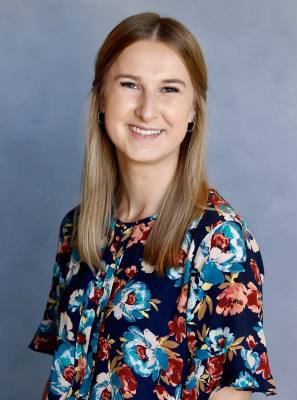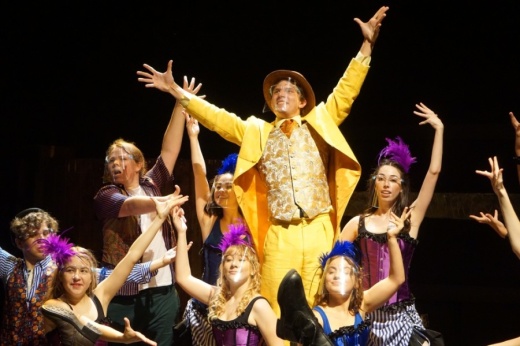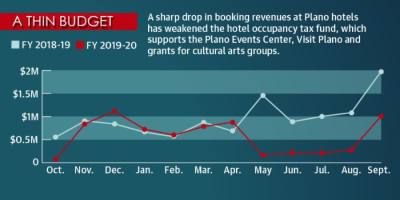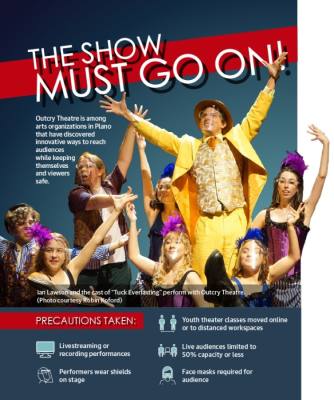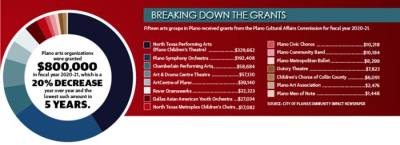A lack of tourism this spring and summer caused a nosedive in hotel-motel occupancy tax revenue, the main funding source for cultural arts grants in Plano. Restrictions on large gatherings led to a downturn in ticket sales, which forced local arts groups to look to virtual platforms as performance settings. Some of these changes have been more costly than others, Reed said.
“With COVID, it’s a constantly moving target,” Plano Symphony Orchestra executive director Robert Reed said. “You have to continually adjust no matter what.”
The symphony is among 15 local arts groups to receive an arts grant from the Plano Cultural Affairs Commission for fiscal year 2020-21. But economic hardship brought on by the pandemic meant the city was forced to cut its total grant allocation to $800,000—the lowest amount in five years.
The commission continues to encourage more support for them, Vice Chair Chris Krupa Downs said.
“I know that so many people need help in the pandemic,” she said. “It’s the food banks; it’s other types of nonprofit organizations ... We just can’t ignore the arts organizations either.”
Reaching audiences
A common way for artists to perform amid COVID-19 restrictions is through online streaming, local arts groups shared. With this technology comes opportunities and challenges.
For organizations like North Texas Performing Arts and Outcry Theatre, streaming requires specific licensing agreements, which sometimes incurs an additional expense.
During recent productions where Outcry Theatre was able to perform both online and in-person, it sold close to the same number of tickets as shows in previous seasons, Marketing Director Jason Johnson-Spinos said. The group also hosted an online script reading for fundraising this summer and offered 24-hour rentals of some recorded performances.
The Plano Comedy Festival held its third annual event in October in a fully virtual format. The experience went so well that its organizers expect to host more online events, festival board member and producer Britainy Goss said.
The group is a first-time event grant recipient with the Cultural Affairs Commission and will put its grant funds toward a big-name headliner for its 2021 festival, she said.
In the visual arts sphere, the ArtCentre of Plano hosted virtual walkthroughs with artists at their upcoming galleries. Each gallery has also been made accessible online, Executive Director Suzy Sloan Jones said. This summer, the long-standing JumpStart for Arts, a learning program for students, transitioned into a take-home arts supply bag with instructions in English and Spanish.
Even as arts groups make these adjustments, there have been losses.
Nationally, there has been an estimated $14.6 billion economic impact on the arts and cultural sector due to the pandemic, according to a survey by the nonprofit Americans for the Arts. In Plano, roughly 67% of 16 responding arts organizations believe the overall financial impact of the pandemic will be extremely severe for their organization, the same survey showed.
For the Plano symphony, streamed performances involve more competition for viewers. The online market is now much bigger, with many arts groups moving to virtual platforms, Reed said. In-person sales are diminished by capacity limits, with venues that used to seat 1,500 people now seating only a few hundred, he said.
To offset these losses, leaders of arts groups have made difficult cuts over the last eight months. They said they plan to budget conservatively through the next fiscal year.
North Texas Performing Arts decided to focus solely on youth programs. That meant temporarily closing its professional group, Repertory Theatre, and canceling concessions for in-person performances, Managing Director Mike Mazur said. Arts staff have taken pay cuts and are working extended hours, he said.
“The parts of our theaters that are mission-driven to give children and their families opportunity to create are what we’ve kept open,” Mazur said.
A budgetary loss
In January, city of Plano staff planned to request $1.5 million from Plano City Council to accommodate a growing need for arts and events grants in FY 2020-21, Cultural Arts Grants Administrator Raini Layne said.
Instead, during the spring planning process for the budget, city operations were cut by 5% across the board in response to the pandemic. That, in combination with the resulting loss of sales and hotel-motel tax revenue, led to an approval of $800,000 for arts grant funding. Additional funding is set aside for events grants each year, although with cancellations and moves to virtual, none was planned for this fiscal year.
These grants are awarded to arts groups at the start of each fiscal year, with applications and hearings for proposed fund uses taking place in the spring and summer. The number of organizations that receive grants stays between 12-16 most years, Layne said, with 15 recipients this fiscal year.
When it became apparent that the grants fund would be significantly cut, the city let applicants know so they could adjust, City Manager Mark Israelson said.
Layne is hopeful the city can begin increasing its arts funding again, possibly by $100,000, she said. But revenue projections for next fiscal year are not encouraging, she said.
“We’re just still in a very volatile situation with travel,” Layne said.
Knowing what’s next
With many concerts and events going online, city performance venues have remained closed during what would typically be a busy season, said Michelle Hawkins, city administrator of Arts, Culture and Heritage.
“We’re not really getting a whole lot of calls at the moment,” she said.
Courtyard Theater, one of the city’s most popular venues, has been closed since March, with the exception of a streamed city event in November.
Plano’s outside venues have begun to close for winter, and Cox Playhouse, a smaller indoor venue, has been rendered essentially useless because of social distancing protocols, Hawkins said.
Hawkins expects there to be plenty of live performances in the city of Plano on the horizon. And once they do make a comeback, the city-owned Courtyard Theater will be able to meet the demand of groups without their own venues as well as audiences in need of a live show, she said.


